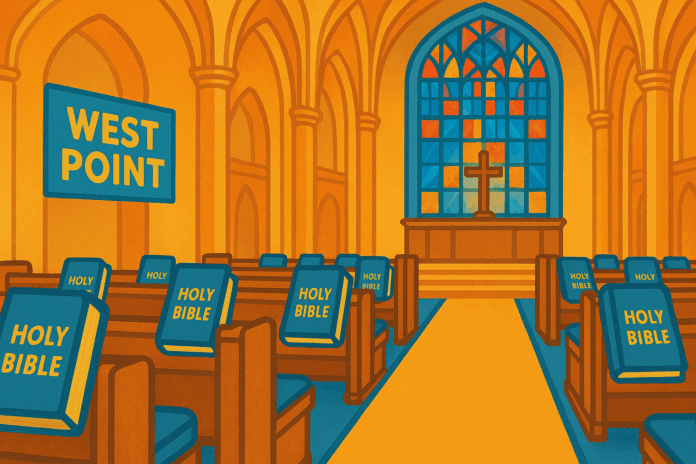Key Facts:
- The Secretary of the Army has reversed a previous decision, ordering the restoration of the West Point crest on chapel Bibles at the U.S. Military Academy.
- The reversal follows a Freedom of Information Act (FOIA) lawsuit filed by Judicial Watch, which sought records related to the removal of the crest.
- Statements from both the Secretary of the Army and Judicial Watch highlight the ongoing debate over religious symbols in the military.
Background: Crest Removal and Reversal
As reported by Fox News, in a significant policy shift, the Secretary of the Army Dan Driscoll has directed the U.S. Military Academy at West Point to restore the academy’s crest to Bibles used in its chapel. This decision reverses an earlier move that had removed the crest.
The original removal of the crest was reportedly made in response to concerns about the separation of church and state, as well as the appropriate use of official military symbols on religious texts. The issue came to the forefront after Judicial Watch, a conservative legal watchdog group, filed a FOIA lawsuit seeking documents and communications regarding the decision to remove the crest.
Judicial Watch Lawsuit Prompted Recent Actions
Judicial Watch initiated its lawsuit after the removal of the crest, arguing that the public had a right to know the reasoning and process behind the decision.
The controversy over the West Point crest is part of a larger, ongoing debate about the role of religious symbols in the U.S. military. Over the years, various incidents have highlighted tensions between the display of religious imagery and the need to ensure that military institutions remain welcoming to individuals of all faiths and beliefs.
Advocates in support of these religious displays argue that symbols like the West Point crest on chapel Bibles are an important part of military tradition. Critics, however, caution that such symbols can blur the line between church and state, potentially alienating non-religious service members or those from minority faiths.
The Army’s decision to restore the crest, following legal pressure and public scrutiny, underscores the complexity of navigating these issues in a diverse and pluralistic military environment.
The legal issue of religious facilities on military bases is one that has historically not been the subject of many lawsuits, with military leaders frequently arguing that chapels and chaplains are necessary on military installations in order to accommodate service members’ religious beliefs. Military chapels are, on paper, described as non-denominational and services for any religion can be held within them, but in practice due to the majority of service members identifying as a Christian denomination they tend to be Christian chapels in function. The inclusion of an official government seal on a Bible provided to servicemembers by the military, however, can be interpreted as a violation of the 1st Amendment of the US Constitution which bars the government from endorsing any specific religion.

